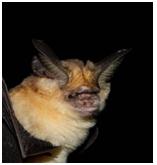Conservation plan on table to save bat species in Kolar caves
The Karnataka Forest Department, along with the Bat Conservation India Trust, is on a war footing to save the remaining bats, which are endemic to the area, from extinction.
Context
- The Karnataka Forest Department, along with the Bat Conservation India Trust, is on a war footing to save the remaining bats, which are endemic to the area, from extinction.
About the Kolar Leaf-Nosed Bat
- It is exclusive to Karnataka.
- They are very adaptable creatures and therefore can often be found near human habitation or even in urban settlements, which makes them vulnerable.
- They are also considered as the carriers of diseases.
- Bats are absolutely vital for the ecology as they are pollinators, their main diet being nectar.
- The plants that bloom at night are entirely dependent on bats and moths for pollination.
- Bats also help in insect control and therefore, help in the protection of crops.
What is the concern over it?
- There are five species of bats that live in the caves of Hanumanahalli, of which the Kolar Leaf-Nosed Bat is just one. And there are around just 150 Kolar Leaf-Nosed Bats left in these caves.
- Bats are one of the least studied mammals in the country, though there are 130 species in India.
What is about the plan?
- The Bat Conservation Society has been entrusted with drawing up a conservation plan.
- It will include identifying and conserve the bats foraging area.
- Awareness campaign will also be launched.
- Guarding the area from encroachers.


